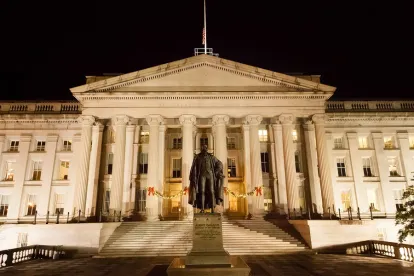A portion of the Treasury’s report entitled “A Financial System That Creates Economic Opportunities, Nonbank Financials, Fintech, and Innovation,” focuses on payments. (See our legal alert for a discussion of other portions of the Treasury’s report.)
Current payment methods. The report notes four primary core payment systems: credit cards, debit cards, automated clearing house (ACH) transfers, and wire transfers. Among the issues facing such systems is that their regulation is fragmented, with the first two systems subject to significant federal regulation, the ACH system heavily dependent on agreement, and wire transfers primarily subject to uniform state law. The report, given its focus, ignores the check system, also regulated by uniform state law, and virtual currency payment methods that have yet to reach significant volume as a payment method.
Nonbank Funds Transfers. The report focuses on nonbank methods of funds transfers between individuals. It discusses money transmitters that, while subject to federal Bank Secrecy Act regulation, are primarily state-licensed and regulated by diverse state statutes and, for multi-state businesses, are subject to burdensome state licensing. The report also discusses the Regulation E remittance provisions, P2P and non-P2P transfers, and so-called digital wallets. The report’s discussion concludes with a review of (1) the effort to encourage faster payments including the Faster Payments Task Force, the Real-Time Payments System of The Clearing House, same day ACH efforts by NACHA and ACH operators, and the challenges these efforts face, and (2) the work of the Secure Payments Task Force.
Recommendations. The Treasury makes the following recommendations:
- States should work to harmonize money transmitter requirements for licensing and supervisory examinations–a task that may require some federal incentives since the Uniform Money Services Act, requested by Congress that the Uniform Law Commission research and write, has only been enacted by 12 states to date;
- The CFPB should provide more flexibility regarding the issue of remittance disclosures in Regulation E; and
- The Federal Reserve should accelerate its efforts to facilitate a faster retail payments system.
Our observations. While the Treasury’s report is a good start, it could have gone much further. Noting the complexity in the U.S. payments system, the Treasury might have recommended that efforts be directed at reconciling the credit and debit card systems for similar issues. For example, the Treasury could encourage the Uniform Law Commission to update Uniform Commercial Code (UCC) payment articles for electronic instruments. Such a project is already under consideration by the UCC sponsors, the Uniform Law Commission, and the American Law Institute for notes which, when completed, would replace paper instruments as the only payment vehicles covered by the UCC. Another recommendation could provide support for the Uniform Regulation of Virtual Currency Businesses Act, which supplies what the Treasury’s report characterizes as the need for “adequate prudential regulation and supervision” for that emerging payment method.



 />i
/>i

